
The Araceae are a family of monocotyledonous flowering plants in which flowers are borne on a type of inflorescence called a spadix. The spadix is usually accompanied by, and sometimes partially enclosed in, a spathe or leaf-like bract. Also known as the arum family, members are often colloquially known as aroids. This family of 114 genera and about 3750 known species is most diverse in the New World tropics, although also distributed in the Old World tropics and northern temperate regions.

Amorphophallus is a large genus of some 200 tropical and subtropical tuberous herbaceous plants from the Arum family (Araceae), native to Asia, Africa, Australia and various oceanic islands. A few species are edible as "famine foods" after careful preparation to remove irritating chemicals. The genus includes the Titan arum of Indonesia, which has the largest inflorescence of any plant in the genus, and is also known as the 'corpse flower' for the pungent odour it produces during its flowering period, which can take up to seven years of growth before it occurs.

Konjac is a common name of the East and Southeast Asian plant Amorphophallus konjac, which has an edible corm (bulbo-tuber). It is also known as konjaku, konnyaku potato, devil's tongue, voodoo lily, snake palm, or elephant yam.

Tainia, commonly known as ribbon orchids or 带唇兰属 is a genus of about thirty species of evergreen, terrestrial orchids in the distributed from India, China, Japan, Southeast Asia to New Guinea, the Solomon Islands and Queensland.
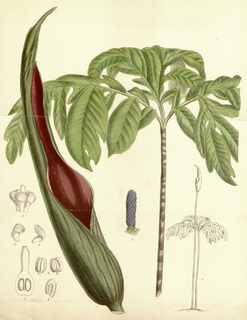
Dracontium is a genus of flowering plants similar to those of Amorphophallus. Unlike Amorphophallus which is found in the Old World, this genus has a New World distribution and is native to South America, Central America, southern Mexico, and the West Indies.

Amorphophallus paeoniifolius, the elephant foot yam or whitespot giant arum, is a tropical tuber crop grown primarily in Africa, South Asia, Southeast Asia and the tropical Pacific islands. Because of its production potential and popularity as a vegetable in various cuisines, it can be raised as a cash crop.
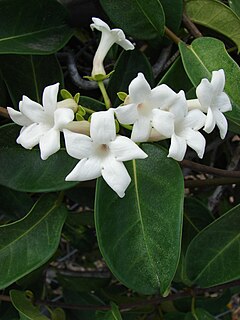
Marsdenia is a genus of plants in the family Apocynaceae first described as a genus in 1810. It is named in honor of the plant collector and Secretary of the Admiralty, William Marsden. The plants are native to tropical regions in Asia, Africa, Australia, and the Americas.

Calochortus dunnii is a rare species of flowering plant in the lily family known by the common name Dunn's mariposa lily.
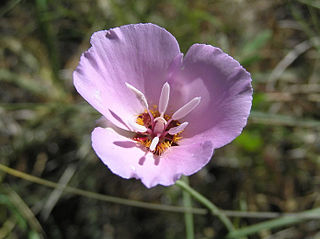
Calochortus palmeri is a species of flowering plant in the lily family known by the common names Palmer's mariposa lily and strangling mariposa.

Gymnema is a genus in the family Apocynaceae first described as a genus in 1810.
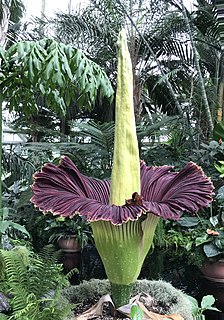
Amorphophallus titanum, the titan arum, is a flowering plant with the largest unbranched inflorescence in the world. The talipot palm, Corypha umbraculifera, has a larger inflorescence, but it is branched rather than unbranched. Amorphophallus titanum is endemic to Sumatra.
Flora of China is a scientific publication aimed at describing the plants native to China.
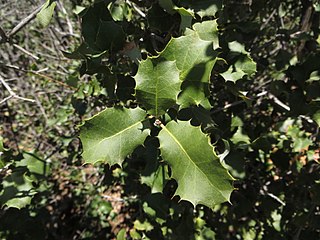
Quercus palmeri is a species of oak known by the common name Palmer oak, or Palmer's oak. It is native to California, Baja California, New Mexico, and in Arizona through the transition zone to the eastern Mogollon Rim, where it grows in canyons, mountain slopes, washes, and other dry habitats. Quercus dunnii Kellogg 1879, common name Dunn oak, is synonymous with Palmer oak.
Stephen Troyte Dunn was a British botanist. He described and systematized a significant number of plants around the world, his input most noticeable in the taxonomy of the flora of China. Among the plants he first scientifically described was Bauhinia blakeana, the national flower of Hong Kong.

Palmerella is a genus of plants in the family Campanulaceae. It has only one known species, Palmerella debilis, long known by the synonym Lobelia dunnii. It is native to 8 counties in southern California plus the northern part of Baja California.
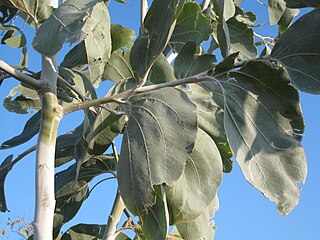
Acacia dunnii, commonly known as elephant ear wattle or Dunn's wattle, is a shrub or tree of the genus Acacia and the subgenus Plurinerves.

Amorphophallus yunnanensis is a flowering plant species native to forests and thickets, at altitudes of 100–3300 meters, in Guangxi, Guizhou, and Yunnan provinces in China, as well as Laos, and northern Thailand and Vietnam.

Amorphophallus bulbifer is a species of subtropical tuberous herbaceous plant found in Assam; Bangladesh; China South-Central; East Himalaya; India; Myanmar; Nepal.
















